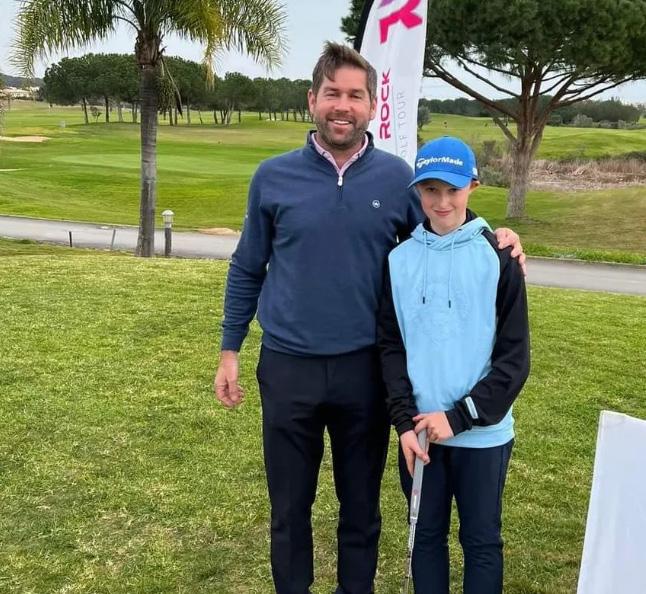
7 minute read
JAMES TURNER LIFE OF A JUNIOR ORGANISER WITH
This month we had the pleasure of speaking with James Turner, Junior Organiser at Trentham Golf Club, keen golfer and father of promising youngster Alfie Turner. In our chat we discussed his role as a junior organiser for a thriving junior section and life as a parent of an up and coming junior who’s becoming successful in the game.
We would also like to take this opportunity to congratulate Alfie for his incredible victory at the European Junior Masters, hosted by the Robert Rock Junior Golf Tour in Portugal. Alfie shot rounds of 76, 78 and 75 to secure the top spot and played the last day with friend, and fellow member of Trentham Golf Club, Albert Lees.
Advertisement
This rounded off a great 2022 season for Alfie, who has claimed multiple victories not only in Staffordshire County competitions but also in UK and European Competitions. It’s been a great season for the 12-year-old.
Gareth Shaw: Talk to me about your own golfing journey?
James Turner: I started playing municipal golf as a 12-year-old at Keele. I also started just hitting balls in a field. I enjoyed it. But my dad wanted me to play football, I was a keen footballer at Port Vale at the time, and my dad didn’t like the distraction of golf!
I started with a pitching wedge and built a set up from there as we couldn’t really afford to go out and buy a set. The first round of golf I played was at Keele with my Dad, with the hire clubs that Colin Smith used to hire out.
I practiced more and more and ended up becoming a member with the Newcastle municipal season ticket as it was called in them days. I think it was £45! When I was about 14 I came down from about 14 to six in the school holidays and then played off around four or five for the next couple of years. I then packed in when I went to University I didn’t have time to do everything.
G.S: Then the journey to Junior Organiser?
J.T: I stopped when Alfie was born in 2011 and in 2016 I joined Trentham Golf Club when he was five. I spent a couple of years getting Alfie into the game and then I started to help Mandy Ambert with the juniors. I started to help with the organisation of the competitions and things like that.
I’ve been involved about three or four years now, I started to enjoy watching them enjoy the game and getting addicted to golf like I was. I just started off as support for Mandy at the beginning.
G.S: We see so many players coming through the junior ranks, is something that you want to instil in the players that you’ve got now, the professionalism, the processes and just learning the game?
J.T: I’ve been a category one golfer for 20-25 years so I feel like I can install better processes to a junior that’s a bit more advanced. I see juniors just walk up to the first tee and I say, why don’t you have a 20 minute warm up, or if you’ve got the time a 45 minute warm up. It’s about installing some better structure to how they practice and how they play.
But then you’ve got the other side of the coin where you’ve got the juniors that just want to enjoy the game. That’s really what we’re here to do. Have juniors enjoying the game and help them develop as golfers.
G.S: You try to integrate the whole team, you’ve got Dan and Ash and it’s more on course stuff that you’re really keen on. Would that be your advice to all the junior organisers out there, you’ve got to build a team around them?
J.T: Yeah we mix it up. We’ve got great junior committees that get involved. So it’s not really just me. Obviously I’m classed as the junior organiser, but I’ve got a great support in Mandy Ambert and others who can cover me if I’m away with Aflie’s busy schedule.
G.S: We’ve touched a bit on Aflie, when did you know he had something special?
J.T: It was around six or seven. Parents are always a bit nice though. But I remember we went to the British Championships, when he was eight or nine. We went to Woodhall Spa, it was his second event. He didn’t win it and he came about fourth or fifth, but he played really well apart from putting and chipping. So, we worked on it when we came back. We talked to his coach Dan Hewitt, who has played a lot of golf himself.
You just want them to develop, you do start to think he’s got some talent but he’s got a long way to go. There’s a 0.001% chance of him becoming a TV golfer. But if we can guide him and he enjoys it, then who knows. The main thing is getting an education, keep practicing golf, enjoying the process and growing up then we can see where he is when he’s 16 or 17.
G.S: You aren’t afraid of asking for advice from others. Like what we talked about in the role of being a junior organiser and building a great committee and a great team, is that the same with a talented athlete?
J.T: Yeah, that I think that comes from my business model for what I do day to day. I’ve got a good team around me. So you’ve got plenty of influences in the decision making process. I feel that’s important and can be important for Alfie.
Whether he needs to talk to his dad or his coach Dan, he needs that. We’ve got some great older heads around here. Tony Coleman, who’s been through it. I’m forever using him for a bit of advice and knowledge.
G.S: I love what you do with Alfie, it’s not solely golf, it’s a multi-sports approach, is that something you bring into the role as well?
J.T: Yeah a lot of the kids, we’ve got a few boys who are all playing football. We do like a winter league which just keeps the game ticking over and winter and we try to start off as late as we can, as they will all be playing football in the morning.
But the multi-sports approach, I think, is important. I think otherwise I think burnout is your main issue. With Alfie, he plays a lot of football, he plays for two football teams, Saturday and Sunday. He plays hockey for his school. He’s swimming, you know, and he’s forever doing something.
Make sure you listen to the James Turner episode on Anchor.fm where he goes into more detail about Alfie’s golf game and tips for parents of children with aspirations to make it as a professional athlete.
April is always a key month in the Professional golf calendar, with one thought on everyone’s minds – The Masters. The 87th edition of The Masters will live long in the memory of Jon Rahm after he secured the coveted green jacket with fantastic score of -12. And now that the curtain has fallen on another great championship it feels like the season is truly underway.
If you didn’t know the first Major of the year is played at Augusta National Golf Club in Atlanta, Georgia. With joining fees rumoured to be between $20,000 - $40,000 on top of a yearly membership the golf course is one of the most expensive clubs in the world to join. You can’t just pay a green fee either!

One of the ways you can play Augusta is to qualify for The Masters, attend a local university, or know one of the rumoured 300 members, like Staffordshire’s very own Ken Horleston did. Ken had the wonderful opportunity to play Augusta National in 1998, with engineer Ted Ericksen. We spoke to Ken about what it was like to take to the coveted fairways.
Gareth Shaw: So this is going to be really special because I know on our previous podcast we touched on Augusta but we didn’t do a deep dive. Shall we take you back to those beautiful fairways and that beautiful vista?
Ken Horleston: You’re in awe of it when you go in there, you know, and you look at the clubhouse and it looks very nice from facade, but you don’t realise just how much there is behind it. Yeah. It’s a really big place.
G.S: Was there anticipation for you to go or did it come round really quickly and you got there and went ‘I’m at Augusta!’
K.H: You know it was some course because of its mysteries, and there’s a lot of mystery. We only see it once a year on the TV and lots of people haven’t seen much beyond the gates and what’s down the drive.
G.S: Is that first experience as we see it on the TV or on social media?
K.H: Yeah, it is. The visitors don’t go in that entrance, they use a bigger entrance. Like if you are just going to play it like we did, then that’s the only way in. It’s very inspiring, you get inside and it’s all very historic.
G.S: What’s the experience like when you get there? Did you turn up a few hours before your tee time? What was the process?
K.H: We went in and you give your shoes to the boot man and he polishes them for you and if you want to, you can have a caddie. I feel sorry for the caddies carrying all the stuff. What we don’t see on TV is that it’s very, very undulating.
If you know the 10th, you go down a hundred feet and then you drop down again to the 11th tee and then you go 12, 13 and 14 comes back up slightly, you know, and then 15 down again. Some of the fairways, I’ve never experienced anything like it before. The fairways run at ten on the stimpmeter!
G.S: How were you on the first hole? Did you have any first tee nerves?
K.H: You just want to make sure you hit the ball!
If you’d like to hear more of Ken’s wonderful stories from Augusta National Golf Club then make sure you listen to Episode 18 of the Staffordshire Union of Golf Clubs pocast where he goes into plenty of more detail on a trip that very nearly all of us can only dream of.








